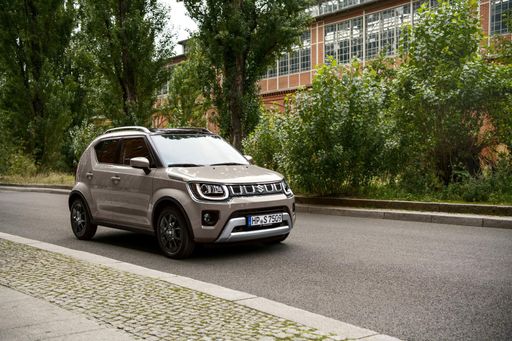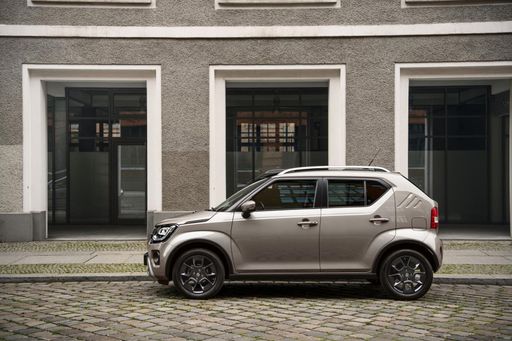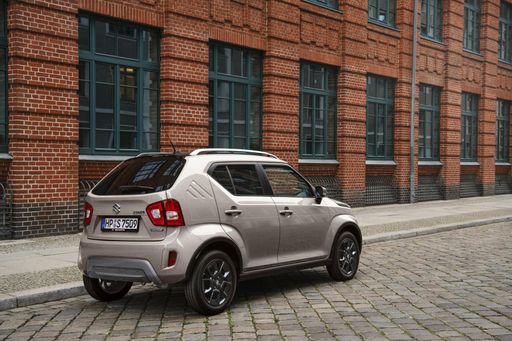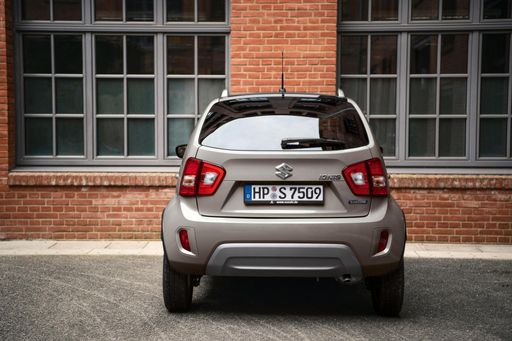Hyundai Kona vs Suzuki Ignis – Performance, range & efficiency compared
Everyday use, family trips or long-distance drives – here’s where the differences show.
Discover whether Hyundai Kona or Suzuki Ignis fits your lifestyle better.
Costs and Efficiency:
Price and efficiency are often the first things buyers look at. Here it becomes clear which model has the long-term edge – whether at the pump, the plug, or in purchase price.
Suzuki Ignis has a clearly advantage in terms of price – it starts at 15600 £, while the Hyundai Kona costs 23100 £. That’s a price difference of around 7449 £.
Fuel consumption also shows a difference: Hyundai Kona manages with 4.60 L and is therefore slight more efficient than the Suzuki Ignis with 4.90 L. The difference is about 0.30 L per 100 km.
Engine and Performance:
Power, torque and acceleration are the classic benchmarks for car enthusiasts – and here, some clear differences start to show.
When it comes to engine power, the Hyundai Kona has a convincingly edge – offering 218 HP compared to 83 HP. That’s roughly 135 HP more horsepower.
In acceleration from 0 to 100 km/h, the Hyundai Kona is clearly quicker – completing the sprint in 7.80 s, while the Suzuki Ignis takes 12.70 s. That’s about 4.90 s faster.
In terms of top speed, the Hyundai Kona performs evident better – reaching 210 km/h, while the Suzuki Ignis tops out at 165 km/h. The difference is around 45 km/h.
There’s also a difference in torque: Hyundai Kona pulls convincingly stronger with 265 Nm compared to 107 Nm. That’s about 158 Nm difference.
Space and Everyday Use:
Beyond pure performance, interior space and usability matter most in daily life. This is where you see which car is more practical and versatile.
Both vehicles offer seating for 5 people.
In curb weight, Suzuki Ignis is clearly lighter – 935 kg compared to 1370 kg. The difference is around 435 kg.
In terms of boot space, the Hyundai Kona offers decisively more room – 466 L compared to 267 L. That’s a difference of about 199 L.
In maximum load capacity, the Hyundai Kona performs slightly better – up to 1300 L, which is about 200 L more than the Suzuki Ignis.
When it comes to payload, Hyundai Kona to a small extent takes the win – 490 kg compared to 395 kg. That’s a difference of about 95 kg.
Who wins the race?
The Hyundai Kona proves to be leaves the rival little chance and therefore becomes our DriveDuel Champion!
Hyundai Kona is the better all-rounder in this comparison.
 @ Hyundai Motor Company
@ Hyundai Motor Company
Hyundai Kona
Hyundai Kona
The Hyundai Kona wears its personality on the outside with bold styling and sprightly handling that turns city driving into something a little more fun than a commute. It blends practical space, modern tech and sensible running costs into a compact, stylish package — a smart pick if you want flair without paying luxury prices.
details @ Hyundai Motor Company
@ Hyundai Motor Company
 @ Hyundai Motor Company
@ Hyundai Motor Company
 @ Hyundai Motor Company
@ Hyundai Motor Company
 @ Hyundai Motor Company
@ Hyundai Motor Company
Suzuki Ignis
The Suzuki Ignis is a compact car that stands out with its unique blend of small SUV aesthetics and city-friendly dimensions. Its playful and distinctive design, combined with a practical and elevated driving position, makes it an appealing choice for urban dwellers seeking versatility without compromising on style. Inside, the Ignis offers a surprisingly spacious cabin with innovative storage solutions, making it ideal for those who need a functional yet characterful vehicle.
details @ Suzuki Motor Corporation
@ Suzuki Motor Corporation
 @ Suzuki Motor Corporation
@ Suzuki Motor Corporation
 @ Suzuki Motor Corporation
@ Suzuki Motor Corporation
 @ Suzuki Motor Corporation
@ Suzuki Motor Corporation
 @ Suzuki Motor Corporation
@ Suzuki Motor Corporation
 @ Hyundai Motor Company
@ Hyundai Motor Company
|
 @ Suzuki Motor Corporation
@ Suzuki Motor Corporation
|
|
|
|
Costs and Consumption |
|
|---|---|
|
Price
23100 - 41600 £
|
Price
15600 - 19500 £
|
|
Consumption L/100km
4.6 - 7 L
|
Consumption L/100km
4.9 - 5.4 L
|
|
Consumption kWh/100km
14.6 - 16.8 kWh
|
Consumption kWh/100km
-
|
|
Electric Range
377 - 514 km
|
Electric Range
-
|
|
Battery Capacity
1.3 - 65.4 kWh
|
Battery Capacity
-
|
|
co2
0 - 163 g/km
|
co2
110 - 122 g/km
|
|
Fuel tank capacity
38 - 47 L
|
Fuel tank capacity
30 - 32 L
|
Dimensions and Body |
|
|---|---|
|
Body Type
SUV
|
Body Type
SUV
|
|
Seats
5
|
Seats
4 - 5
|
|
Doors
5
|
Doors
5
|
|
Curb weight
1370 - 1773 kg
|
Curb weight
935 - 995 kg
|
|
Trunk capacity
466 L
|
Trunk capacity
204 - 267 L
|
|
Length
4350 - 4385 mm
|
Length
3700 mm
|
|
Width
1825 mm
|
Width
1690 mm
|
|
Height
1580 - 1585 mm
|
Height
1605 mm
|
|
Max trunk capacity
1300 L
|
Max trunk capacity
1086 - 1100 L
|
|
Payload
420 - 490 kg
|
Payload
335 - 395 kg
|
Engine and Performance |
|
|---|---|
|
Engine Type
Electric, Petrol, Full Hybrid
|
Engine Type
Petrol MHEV
|
|
Transmission
Automatic, Manuel
|
Transmission
Manuel, Automatic
|
|
Transmission Detail
Reduction Gearbox, Manual Gearbox, Dual-Clutch Automatic
|
Transmission Detail
Manual Gearbox, CVT
|
|
Drive Type
Front-Wheel Drive, All-Wheel Drive
|
Drive Type
Front-Wheel Drive, All-Wheel Drive
|
|
Power HP
115 - 218 HP
|
Power HP
83 HP
|
|
Acceleration 0-100km/h
7.8 - 11.9 s
|
Acceleration 0-100km/h
12.7 - 12.8 s
|
|
Max Speed
162 - 210 km/h
|
Max Speed
155 - 165 km/h
|
|
Torque
200 - 265 Nm
|
Torque
107 Nm
|
|
Number of Cylinders
3 - 4
|
Number of Cylinders
4
|
|
Power kW
85 - 160 kW
|
Power kW
61 kW
|
|
Engine capacity
998 - 1598 cm3
|
Engine capacity
1197 cm3
|
General |
|
|---|---|
|
Model Year
2024 - 2025
|
Model Year
2020
|
|
CO2 Efficiency Class
A, D, C, E, F
|
CO2 Efficiency Class
C, D
|
|
Brand
Hyundai
|
Brand
Suzuki
|
Is the Hyundai Kona offered with different drivetrains?
Available configurations include Front-Wheel Drive or All-Wheel Drive.
The prices and data displayed are estimates based on German list prices and may vary by country. This information is not legally binding.
